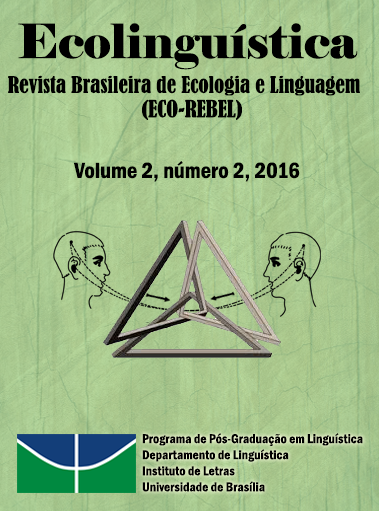Is ecolinguistics necessary?
Keywords:
Discourse; Environmental Studies; Epistemology; Language Ecology; Linguistic Theory.Abstract
This paper considers whether studies separate from more general linguistic enquiry are necessary at all if we do our general (diachronic and synchronic) nobly. The emphasis is on the eco- of ecolinguistics rather than the necessary. The argument is that the philosophical core of ecolinguistic research is far from new and exists and advances on perennial (historical) linguistic bedrock. The methodological and theoretical thrust of ecolinguistics can be posed as a logical extension of any detailed consideration of elements of analysis necessitated under what can be considered traditional general linguistics and a parameter rich sociolinguistics. It is argued the details of ecolinguistics have been, at least philosophically, addressed in earlier linguistic work, and that the fundaments of ecolinguistics ought not (necessarily) be new to linguistics and may merely be a recently developed appellative for what are recurrent concerns in linguistic science. The query is that if ecolinguistics is old (linguistic) wine freshly housed in new (ecologically focused) bottles, what do the monikers ecolinguistics and linguistic ecology as fields of research actually offer? Despite my critical position, I believe ecolinguistic studies do have a worthy contribution to make both to linguistics and to environmental studies research.
Downloads
References
BANG, J.C. & DØØR, J. Language, ecology and society: A dialectical approach. Edited by S.V. STEFFENSEN & J. NASH, London: Continuum, 2007.
HARRÉ, R., BROCKMEIER, J., & MÜHLHÄUSLER, P. Greenspeak: A study of environmental discourse. Thousand Oaks, CA: Sage, 1999.
MÜHLHÄUSLER, P. Language of Environment - Environment of Language. London: Battlebridge, 2003.
MÜHLHÄUSLER, P. Talking about environmental issues. Language & Communication v. 3, n. 1, 1983, p. 71-81.
Downloads
Published
How to Cite
Issue
Section
License
Authors who publish in this journal agree to the following terms:
Authors retain copyright and grant the journal the right of first publication. The work is simultaneously licensed under the Creative Commons Attribution License allowing the sharing of the work with acknowledgment of the authorship of the work and initial publication in this journal.
Authors are authorized to enter into additional contracts separately for non-exclusive distribution of the version of the work published in this journal (e.g., publishing in institutional repositories or as book chapters), with acknowledgment of authorship and initial publication in this journal.
Authors are allowed and encouraged to post and distribute their work online (e.g., in institutional repositories or on their personal page) at any point before or during the editorial process, as this can bring about productive revisions as well as increase impact.
Citation of published works (See The Effect of Free Access).



3.png)



